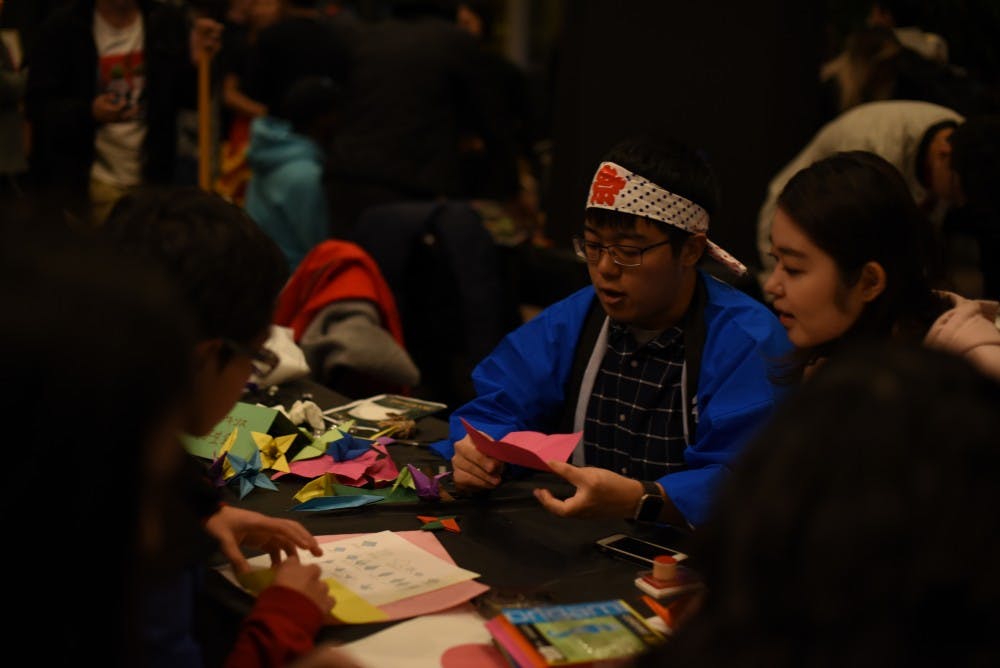The Office of Multicultural Affairs (OMA) hosted its first annual Cultural Festival on Saturday. The event featured numerous student groups and offered food, games, music and a glimpse into diverse cultures.
By allowing students to explore cultural diversity at Hopkins, many of the groups at the event hoped to showcase the nuances of their identities and some of the unique experiences they have learned from their own culture.
Junior Meera Sooda, a representative for South Asian Students at Hopkins (SASH), saw the event as an opportunity to educate students about her heritage. At her organization’s booth, which showed students Hindi translations of their names, Sooda described the importance of cultural exposure.
“We have a really rich culture here at Hopkins,” Sooda said. “People love showing up to our religious and social events and interacting with people in the community.”
Sooda stated that her organization attended the event to spread awareness about diversity within the South Asian community.
“There’s a lot of visibility for Indian people on campus, but we also need to encompass people from countries like Pakistan, Nepal, Bangladesh and Sri Lanka,” Sooda said. “We’re all different, but we are one entity in the sense that we come together for certain events. That’s why it’s so important to increase the visibility of cultures from smaller South Asian countries.”
Similarly, sophomore Coralie Mentor, a representative of the Caribbean Cultural Society, wanted to use her organization’s presence at the festival to discuss the importance of solidarity among students of Caribbean heritage.
“We want to have open conversations about how to unite the different cultures that exist within [the Caribbean],” Mentor said. “We should be able to say that ‘I am proud to be from Haiti, but I’m also proud to be from an area where peoples’ values are similar to mine and where people are encouraging and inclusive.’ And we need to open that mindset up to outsiders.”
Many student groups present at the event shared Mentor’s sentiment about the need to form broader cultural identities.
Junior Kendall Free, who manned the Black Student Union’s (BSU) booth, came to the event to highlight her organization’s commitment to increasing the visibility of black culture and black students at Hopkins. For Free, participating in the event served as a way to express both the BSU’s history on campus and the sense of solidarity she feels in the University’s black community.
“Rather than representing one culture, the BSU is an umbrella group for all black diaspora groups on campus. We’ve been around for over 50 years,” Free stated. “The biggest thing that we’re currently focusing on is not only trying to promote the Black Lives movement on campus but also getting a better experience for black students in terms of academic affairs.”
While Free argued that black culture and the black student body is adequately represented in student government, she feels as though her organization still has a lot of work to do in regards to faculty and administrative representation, as well as creating more courses on black history.
Though Free took the opportunity to discuss political action with students, she also highlighted the importance of celebrating diversity in general at Hopkins.
“There’s a lot to learn about tons of other minority students’ experiences that aren’t usually told,” she said.
Students like Kimberly González, president of the Latina sorority Hermandad de Sigma Iota Alpha, agreed that celebrations of cultural diversity serve an important role in fostering empathy on campus.
While offering other students some Brazilian sweet bread, she talked about why she felt that the Cultural Festival did a great job of capturing the University’s diverse cultural body.
“Your culture does affect the way you go through life and the opportunities you have or the things you get involved in,” Gonzalez said. “For that reason, I just love learning about other countries and having that diversity. When I came to Hopkins, I really learned about so many different cultures and people here. That’s what we’re here for — to learn.”
Overall, attendees and organizers alike said that they enjoyed the food and the festival’s spotlight on cultural diversity. Many students like Sooda found the event both entertaining and educational, and look forward to having similar events in the future.
“If we don’t have events like this, everyone will just clique up and be in their own groups,” she said. “Even tonight, I met many people from different organizations and learned about their cultures. It’s been fun and informative, and I think it’s good for cross-cultural engagement.”





